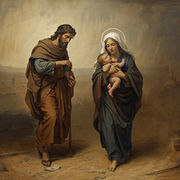A Parable About Good and Evil
- Jul 23, 2017
- 2 min read
Pastor’s Column
16th Sunday Ordinary Time
July 23, 2017

Why does God allow evil to exist in our world? This is one of the most vexing of all questions. Jesus gives us part of the answer this Sunday in the parable of the weeds and the wheat (Matthew 13:24-30). The servants of the master’s household are perplexed because weeds have begun growing amid the good crop. How did they get there? Should they pull them up right away?
This “weed” is a real plant that Jesus’ hearers would have been very familiar with. It is called darnel, and it looks so much like wheat that you can’t always tell which plant is which – until the end. The wheat is edible, but the weed is poisonous! The servants’ first reaction is to pull all the bad stuff right out, but the master has a better plan – to wait until the harvest time, so that the wheat is not destroyed along with the weeds.
The weeds were sown by an enemy – the devil. God is not the source of evil in our world, but he does allow both good and evil, weeds and wheat, to co-exist for a time. The ultimate end of the weeds is to be burned, while the wheat will go to the master’s barn – in other words, the home of God, or heaven. In the end, you can recognize the wheat by the good fruit it produces – and the weed by the poison. We will know which is which, in the end, by the fruits produced.
The master has a plan. In this world, God gives everyone time to repent of their sins, to discover what the meaning of life is (love thy neighbor). So part of the answer is that God is being patient with the wicked. Ultimately, the wheat, the children of God, will be tested by having to battle with the forces of evil, and will be proven by the fight.
In the end, the reason the whole field is not plowed over at once by the master is because of the presence of the wheat. God is depending on the children of God to be the wheat of this world. Evil looks very attractive in this world and is chosen by many. Those who do evil usually think they are getting away with something, or that God does not see, or that he does not care, or that he is not there. In reality, God sees all, knows all, and is waiting and watching. He has the last word. Christ finishes by saying “whoever has ears, ought to listen.”
Father Gary























Comments